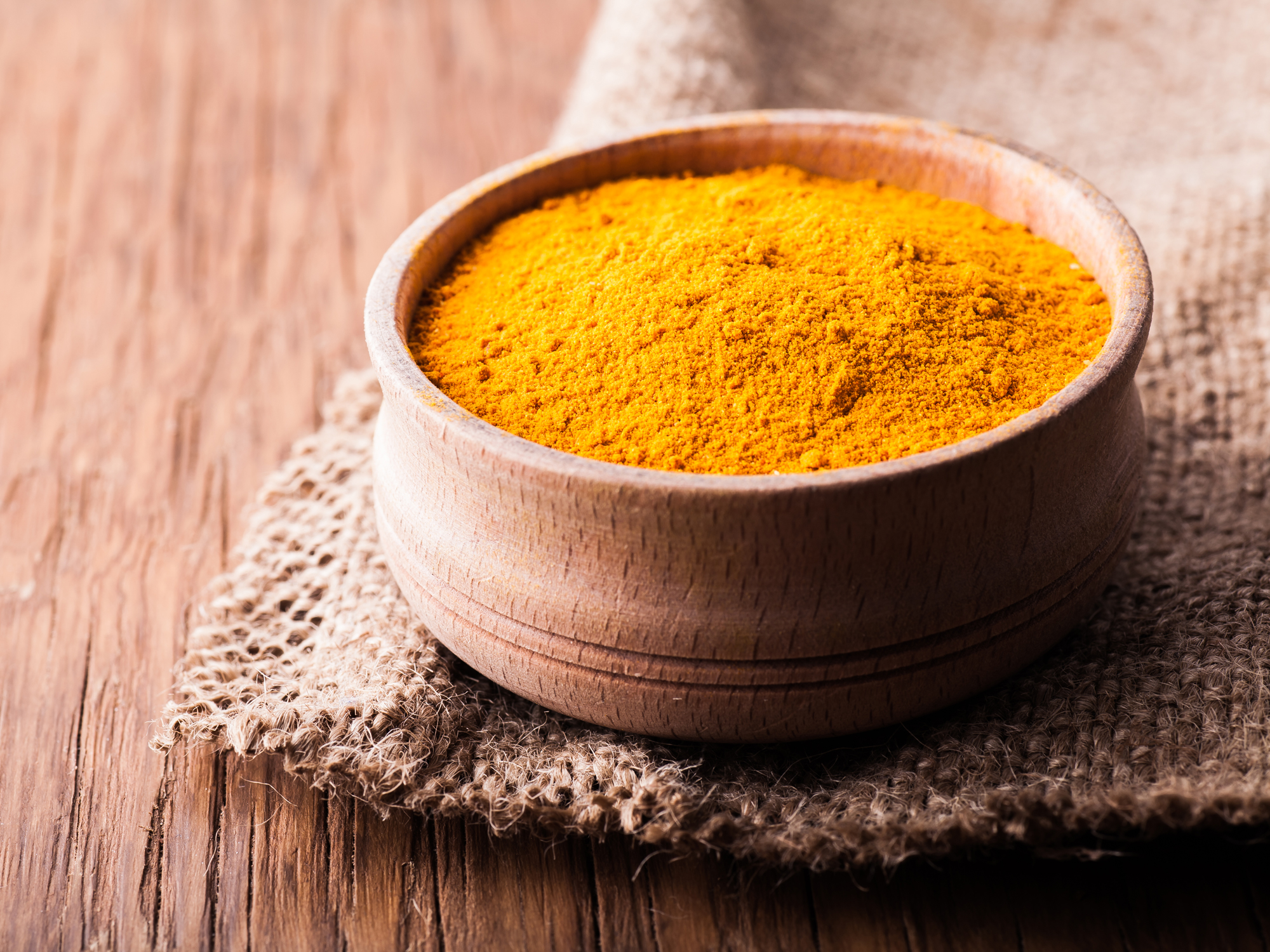Get Easy Health Digest™ in your inbox and don’t miss a thing when you subscribe today. Plus, get the free bonus report, Mother Nature’s Tips, Tricks and Remedies for Cholesterol, Blood Pressure & Blood Sugar as my way of saying welcome to the community!
Choose ‘gold’ spice, not old spice, for male health

Turmeric (Curcuma longa) is a perennial plant whose roots are ground into a popular golden spice.
The active ingredient in turmeric is curcumin, which gives the spice its bitter, peppery taste.
Traditionally turmeric has been used to fight inflammation, colds, and asthma, but in recent years scientists have also discovered a wide variety of reasons why curcumin/turmeric is good for men’s health.
A secret of curcumin’s healing abilities appears to be its ability to increase the levels of a protein called cathelicidin antimicrobial peptide (CAMP), which has a key role in the immune system that helps prevent infection. This discovery was uncovered by researchers in the Linus Pauling Institute at OSU, who collaborated with scientists from the University of Copenhagen.
Specifically, the researchers found that curcumin increased expression of the CAMP gene by nearly threefold, and thus could be helpful in preventing infection. Vitamin D also has the ability to boost expression of the CAMP gene, and it is more potent than curcumin in this regard.
Curcumin’s anti-inflammatory properties have demonstrated an ability to relieve symptoms in inflammatory conditions, including rheumatoid arthritis, inflammatory bowel, and psoriasis, among others. But some of curcumin’s most beneficial effects for men’s health involve the prostate.
Curcumin and prostate cancer prevention
Turmeric is considered an anticancer food and spice because it possesses a variety of important cancer-fighting properties.
In the January 2012 issue of Frontiers of Bioscience, for example, the authors remarked that curcumin “appears to involve a blend of anti-carcinogenic, pro-apoptotic, anti-angiogenic, anti-metastatic, immunomodulatory and antioxidant activities.” In other words, curcumin seems to fight cancer from multiple fronts.
 Some of those fronts have been demonstrated in studies like one from a group of scientists at Rutgers, The State University of New Jersey, who found that turmeric alone and combined with a phytonutrient (phenethyl isothiocyanate, or PEITC) derived from cruciferous vegetables (e.g., broccoli, cabbage) may be effective in preventing and treating prostate cancer, and that the combination significantly reduced tumor growth.
Some of those fronts have been demonstrated in studies like one from a group of scientists at Rutgers, The State University of New Jersey, who found that turmeric alone and combined with a phytonutrient (phenethyl isothiocyanate, or PEITC) derived from cruciferous vegetables (e.g., broccoli, cabbage) may be effective in preventing and treating prostate cancer, and that the combination significantly reduced tumor growth.
A 2009 study from Oregon Health and Science University reported that curcumin has “potential anti-metastatic [anti-spreading] effects in bone-derived prostate cancer cells.” Yet other research, this time from Columbia University, found that turmeric has the ability to cause prostate cancer cells to “commit suicide,” a process known as apoptosis. In a subsequent study, experts found that turmeric inhibited the growth of both human and animal prostate cancer cell lines.
The results of a pre-clinical study suggest curcumin may be helpful in men with castration-resistant prostate cancer who were taking hormone therapy (androgen deprivation therapy [ADT). A research team at Thomas Jefferson University’s Kimmel Cancer Center used prostate cancer cells and showed that curcumin suppressed two substances (p300 and CPB) known to work against hormone therapy. In addition, they investigated the use of curcumin in mice and noted prostate cancer tumor growth and mass were significantly reduced in mice dosed with the spice.
Curcumin/turmeric and prostatitis treatment
Curcumin’s anti-inflammatory properties make it a good candidate for managing prostatitis. In an animal study, investigators reported that curcumin was effective in managing chronic nonbacterial prostatitis, noting that it reduced the activity of the pro-inflammatory cytokines interleukin-8 and tumor necrosis factor-alpha.
In another study, a combination of curcumin, quercetin, saw palmetto, and stinging nettle was administered to men with prostatitis. Compared with men who received an antibiotic alone, those who took the herbal combination as well as the antibiotic had significantly better resolution of their symptoms.
How to take curcumin/turmeric
The suggested dose of turmeric as a standardized powder (curcumin) is 400 to 600 mg three times daily. Turmeric and curcumin are safe when taken as directed. According to Dr. Andrew Weil, founder and director of the Arizona Center for Integrative Medicine, unless you have inflammatory bowel disease, the best way to reap the benefits of turmeric is by adding it to your diet. Turmeric can be added to foods during and after cooking.
Sources:
- Cai T et al. Serenoa repens associated with Urtica dioica (ProstaMEV) and curcumin and quercetin (FlogMEV) extracts are able to improve the efficacy of prulifloxacin in bacterial prostatitis patients: results from a prospective randomized study. Int J Antimicrob Agents 2009 Jun; 33(6): 549-53
- Shah S et al. Targeting pioneering factor and hormone receptor cooperative pathways to suppress tumor progression. Cancer Research 2012 Mar 1; 72(5): 1248-59
- Slusarz A et al. Common botanical compounds inhibit the hedgehog signaling pathway in prostate cancer. Cancer Research 2010 Apr 15; 70(8): 3382-90
- University of Maryland. Turmeric
- White B, Judkins DZ. Clinical inquiry. Does turmeric relieve inflammatory conditions? Journal of Family Practice 2011 Mar; 60(3): 155-56
- Weil A. Turmeric health.
- Zhang QY et al. Reducing effect of curcumin on expressions of TNF-alpha, IL-6 and IL-8 in rats with chronic nonbacterial prostatitis. Zhonghua Nan Ke Xue 2010 Jan; 16(1): 84-88












